EVENTS
Alleged Mismanagement Of $4.5 Billion World Bank & Chinese Loan: SERAP Urges Tinubu To Investigate 36 States, FCT And Previous Government Of Buhari, Says Those Guilty should Face Prosecution As Appropriate.
Published
8 months agoon
By
Ekwutos Blog
Socio-Economic Rights and Accountability Project (SERAP) has urged President Bola Tinubu, to direct the Attorney General of the Federation and Minister of Justice, Lateef Fagbemi (SAN) and appropriate anti-corruption agencies, to promptly and thoroughly investigate the spending of $1.5bn World Bank loan obtained by the 36 states and Abuja for poverty reduction and social protection across the states.
SERAP said, “Suspected perpetrators of corruption and mismanagement should face prosecution as appropriate, if there is sufficient admissible evidence, and any proceeds of corruption should be fully recovered.”
SERAP also urged him to direct Fagbemi and appropriate anti-corruption agencies to promptly investigate the alleged mismanagement of the Chinese loans of $3.121bn obtained by the Federal Government.
In the open letter dated 10 August 2024 and signed by SERAP deputy director Kolawole Oluwadare, the organisation said ensuring accountability for the spending of World Bank loans and Chinese loans, would build trust in democratic institutions with the ultimate aim of strengthening the rule of law.
Impunity for corruption in the management of World Bank loans and Chinese loans will continue as long as high-ranking public officials go largely unpunished for their alleged crimes.
“It is by pursuing these allegations and taking the evidence before the court that the truth will be revealed and justice best served.
“There are reports that the $1.5bn World Bank loan to the 36 states and Abuja and the $3bn Chinese loans obtained by the Federal Government may have been mismanaged or diverted, and in any case remain unaccounted for.
“Investigating and prosecuting allegations of corruption and mismanagement in the spending of World Bank loans and Chinese loans would be entirely consistent with the Nigerian Constitution, and the country’s international anti-corruption obligations.
“We note that while a governor may enjoy immunity from arrest and prosecution, he does not enjoy immunity from investigation. Any criminal allegation against a sitting governor can and should be investigated pending the time the governor leaves office and loses immunity.
“The findings of such investigation can also be the basis for initiating impeachment proceedings against the governor.
“Your government has the legal obligation to ensure accountability for the spending of the loans obtained from the World Bank and China. SERAP is concerned about the continuing lack of transparency and accountability in the management of World Bank loans and Chinese loans obtained by the states and the Federal Government.
“We would be grateful if the recommended measures are taken within 7 days of the receipt and/or publication of this letter. If we have not heard from you by then, SERAP shall consider appropriate legal actions to compel your government to comply with our request in the public interest.
SERAP said it is concerned about years of allegations of corruption and mismanagement in the spending of World Bank loans and Chinese loans obtained by Nigeria’s 36 states and the Federal Government, as well as the entrenched impunity of perpetrators.
“These allegations have undermined the ability of governments at all levels to address the debilitating poverty and economic inequality across the states and the Federal Capital Territory.
“Section 15(5) imposes the responsibility on your government to ‘abolish all corrupt practices and abuse of power’ in any part of the country. Section 15 defines ‘government’ to include the government of the federation, or of any state, or of a local government council or any person who exercises power or authority on its behalf.
“The Nigerian Constitution and human rights treaties to which Nigeria is a state party impose obligations on your government to probe and prosecute allegations of corruption in the spending of World Bank loans and Chinese loans, and to ensure access to justice and effective remedies for victims of corruption.
“Allegations of corruption and mismanagement in the spending of these loans and other loans have rendered already impoverished citizens incapable of satisfying their minimum needs for survival.
“Prevention of corruption in the spending of World Bank loans and other loans are serious and legitimate public interests. There is a legitimate public interest in ensuring justice and accountability for alleged corruption and mismanagement in the management of these loans.
“According to our information, the World Bank on 15 December 2020 approved a $1.5 billion loan for Nigeria’s 36 states and Abuja for social protection and strengthened state-level COVID-19 response. The loan aims to help the states and Abuja build a resilient recovery post-COVID19 and to reduce poverty.
“Specifically, the loan aims to increase access to basic education, quality water and sanitation services; improve primary healthcare; and increase the coverage and effectiveness of social assistance programs, promote women’s empowerment and reduce maternal and child mortality across the states.
“The $1.5 billion World Bank loan is for two projects. The first is Nigeria Covid-19 Action Recovery and Economic Stimulus – Program for Results (Nigeria CARES) which aims to help increase access to social transfers and basic services, as well as provide grants to poor and vulnerable households. The project is financed through an International Development Association (IDA) credit of $750 million.
“The second is the State Fiscal Transparency, Accountability and Sustainability Program for Results (SFTAS), which aims to help increase the efficiency in spending, strengthen revenue mobilization, and enhance accountability in public resource management to strengthen state-level COVID-19 response.
“The project is financed through an International Development Association (IDA) credit of $750 million.
“According to the Debt Management Office, the total borrowing by Nigeria from China was USD$3.121 billion, as of March 31, 2020. The USD$3.121 billion loans are for 11 projects including the Nigerian Railway Modernization Project (Idu-Kaduna section); and Abuja Light Rail Project.
“Others include the Nigerian Four Airport Terminals Expansion Project (Abuja, Kano, Lagos and Port Harcourt), Nigerian Railway Modernization Project (Lagos-Ibadan section) and Rehabilitation and Upgrading of Abuja – Keffi- Makurdi Road Project.
“According to the Debt Management Office, Nigeria’s total public debt stock, including external and domestic debts, increased by ₦24.33 trillion in three months alone, from ₦97.34 trillion ($108.23 billion) in December 2023 to ₦121.67 trillion ($91.46 billion) as of March 31, 2024.
“The debt represents external and domestic loans obtained by the Federal Government, the 36 state governments and the Federal Capital Territory (FCT).”
Follow ekwutosblog for timely and verified news
You may like
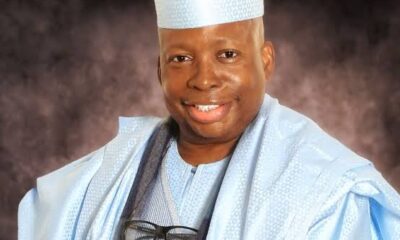

PRESIDENT TINUBU CELEBRATES DR OLADELE FAJEMIROKUN ON 75th BIRTHDAY
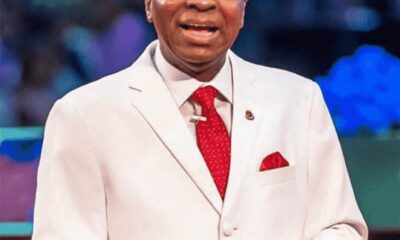

The night hired killers tried to assassinate my father – Bishop David Oyedepo’s daughter
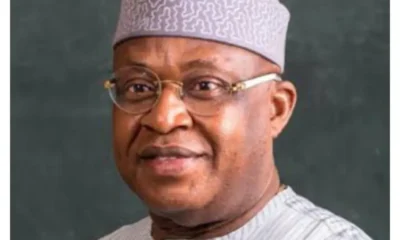

Wike not PDP’s problem – Dan Orbih reveals those behind party crisis
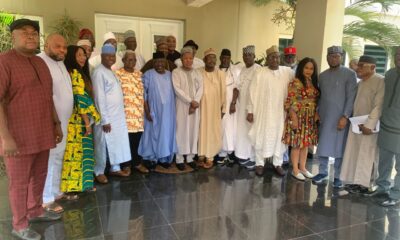

FORMER CPC LEADERS IN APC REAFFIRM LOYALTY TO PARTY, PRESIDENT TINUBU


Dangote Refinery has once more reduced the prices of its fuel, lowering the ex-depot rate to N835 per liter.
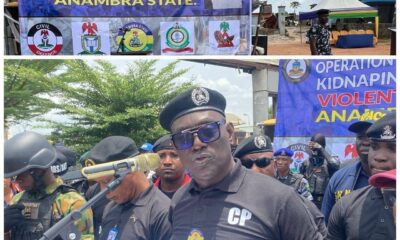

OPERATION UDO GA CHI – ZERO KIDNAPPING IN ANAMBRA: CP ORUTUGU SETS UP A MONITORING TEAM TO ENSURE OPERATIVES ARE CIVIL AND COMPLIES WITH THE OPERATIONAL ORDER; ALSO THANKS THE STATE GOVERNMENT AND STAKEHOLDERS FOR THEIR SUPPORT AND APPRECIATES THE SACRIFICES OF POLICE AND OTHER SECURITY AGENCIES
EVENTS
Benue killings: Three suspected herdsmen arrested
Published
2 hours agoon
April 16, 2025By
Ekwutos Blog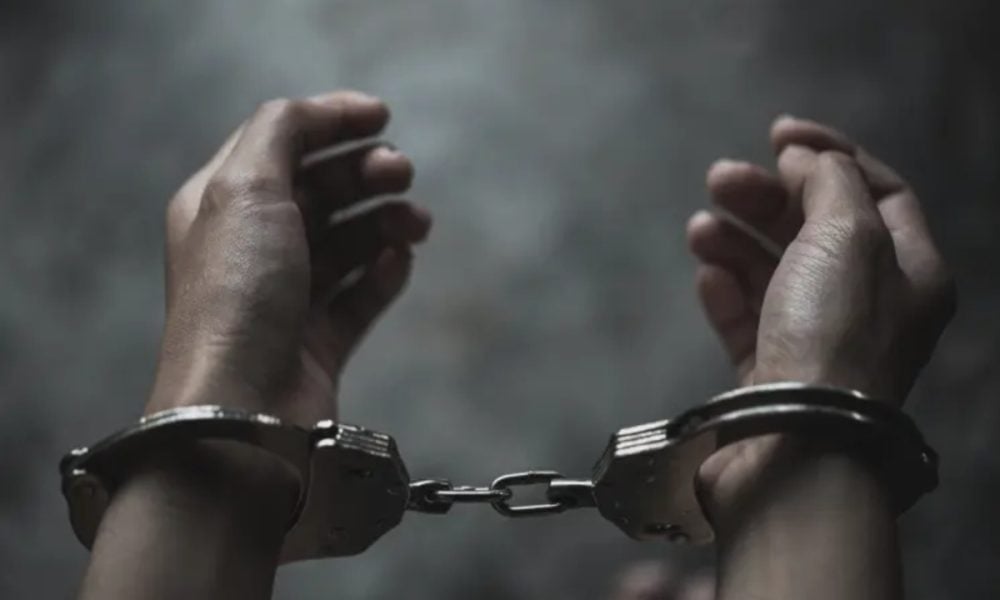
Three suspected herdsmen have been arrested in connection with the brutal attack on Otobi community in Otukpo Local Government Area, Benue State, which left 11 residents dead.
Governor Hyacinth Alia made this known on Wednesday during a briefing with journalists at the Government House in Makurdi, the state capital.
He expressed deep concern over the escalating violence and urged security agencies to intensify efforts in apprehending those responsible for the attacks.
Governor Alia further disclosed that the National Security Adviser, Nuhu Ribadu, had pledged to deploy additional security forces to Benue to curb the recent wave of violence, particularly in the Otukpo axis.
He added that the state government has also stepped up its own security presence in the affected areas, resulting in the arrest of the three suspects linked to the killings in Otobi.
EVENTS
IDF eliminates terrorist behind January West Bank shooting
Published
2 hours agoon
April 16, 2025By
Ekwutos Blog
Israeli security forces on Wednesday morning killed Muhammad Zakarna, a member of the Palestinian Islamic Jihad, during a counterterrorism operation near Jenin.
Zakarna was identified as one of the terrorists involved in the deadly shooting attack in the West Bank village of al-Funduq in January.
According to the Israel Defense Forces (IDF), Zakarna, a resident of Qabatiya, was among three gunmen who opened fire on civilians in al-Funduq on January 6, killing Master Sgt. Elad Yaakov Winkelstein, an off-duty Israeli police officer, and civilians Rachel Cohen and Aliza Raiz.
The IDF said Zakarna was located in a cave near the village of Misilyah following intelligence provided by the Shin Bet security agency.
During the attempted arrest by Yamam, the Israel Police’s elite counterterrorism unit, and IDF troops, a gun battle broke out between the forces and the suspects.
The military said the forces used shoulder-launched missiles during the exchange. Zakarna and another Islamic Jihad member, Marooh Hazima, also from Qabatiya, were killed.
Hazima had previously been released from Israeli prison in the November 2023 ceasefire-hostage deal with Hamas and had since resumed terrorist activity, the IDF said.
A number of weapons and military gear were recovered from the scene. Several accomplices were also detained and found to be in possession of handguns.
The IDF confirmed that the other two terrorists behind the al-Funduq attack, Qutaiba al-Shalabi and Mohammed Nazal, both affiliated with Hamas — were previously killed in an Israeli operation in Qabatiya on January 23.
EVENTS
Recently Engaged Blessing CEO Shares the Story of How She Met and Fell for Fiancé IVD
Published
15 hours agoon
April 16, 2025By
Ekwutos Blog
Blessing Okoro, known as Blessing CEO, has recounted the touching tale of how she encountered and fell in love with entrepreneur Ikechukwu Ogbonna, affectionately called IVD.
Their journeys intertwined in late 2022 during a challenging time for IVD. Following the unfortunate passing of his wife, Bimbo, in a fire tragedy, IVD endured severe public criticism and legal troubles. In the midst of this turmoil, Blessing CEO stepped forward to support him when many others turned away. She reached out after he shared a troubling message, offering her friendship and emotional assistance.
At first, Blessing CEO insisted that their connection was strictly professional, clarifying that IVD was merely her client. However, as time went on, their relationship grew stronger. By January 2025, she openly acknowledged their romantic relationship, describing IVD as a “kind-hearted individual” and expressing her gratitude for having met him during his difficult times.
Following her engagement announcement to IVD, Blessing has finally disclosed how their love story began.
Photo source: Instagram







PRESIDENT TINUBU CELEBRATES DR OLADELE FAJEMIROKUN ON 75th BIRTHDAY

The night hired killers tried to assassinate my father – Bishop David Oyedepo’s daughter

Wike not PDP’s problem – Dan Orbih reveals those behind party crisis
Trending

 Trending6 months ago
Trending6 months agoNYA demands release of ‘abducted’ Imo chairman, preaches good governance
- Business6 months ago
US court acquits Air Peace boss, slams Mayfield $4000 fine

 Politics6 months ago
Politics6 months agoMexico’s new president causes concern just weeks before the US elections
- Entertainment6 months ago
Bobrisky transferred from Immigration to FCID, spends night behind bars
- Entertainment6 months ago
Bobrisky falls ill in police custody, rushed to hospital

 Politics6 months ago
Politics6 months agoRussia bans imports of agro-products from Kazakhstan after refusal to join BRICS

 Politics6 months ago
Politics6 months agoPutin invites 20 world leaders
- Politics1 year ago
Nigerian Senate passes Bill seeking the establishment of the South East Development Commission.

